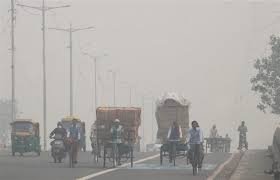
With air quality in Delhi deteriorating to hazardous levels, Chief Minister Arvind Kejriwal has taken the decision to close all government and private primary schools in the city for the next two days. This move comes as a response to the increasing levels of air pollution, with the Air Quality Index (AQI) in the national capital reaching severe levels.
“In light of the rising pollution levels, all government and private primary schools in Delhi will remain closed for the next 2 days,” Chief Minister Kejriwal announced through a social media post. While physical classes are suspended, online classes will continue for schools operated by the Municipal Corporation of Delhi (MCD), and the schools will remain open for teachers and staff.
The Directorate of Education, Delhi, issued an order confirming the suspension of all preschool, pre-primary, and primary classes, from Nursery to Class V, in physical form for the two days. The order specified that teachers of these classes will conduct online classes during this period.
Delhi has been grappling with increasingly hazardous air quality in recent days, exacerbated by a combination of factors, including stubble burning in neighboring states, vehicular emissions, and industrial pollution. The city’s Air Quality Index (AQI) reached 402 at 5 pm, marking the worst air quality of the season so far. In the preceding days, the 24-hour average AQI stood at 364 (Wednesday), 359 (Tuesday), 347 (Monday), 325 (Sunday), 304 (Saturday), and 261 (Friday).
The decision to close primary schools followed an order from the Commission of Air Quality Management (CAQM) in Delhi-NCR, which initiated all actions outlined under Stage III of the Graded Response Action Plan (GRAP) for ‘severe’ air quality. The panel observed a sharp rise in the average AQI in Delhi and anticipates further deterioration due to unfavorable meteorological and climatic conditions.
Measures implemented under Stage III of GRAP include a ban on non-essential construction and demolition activities. The GRAP classifies actions into four stages: Stage I (‘poor’ with AQI 201-300), Stage II (‘very poor’ with AQI 301-400), Stage III (‘severe’ with AQI 401-450), and Stage IV (‘severe plus’ with AQI above 450).
As the city grapples with severe air pollution, the closure of primary schools is one of several measures taken to mitigate the impact on public health and well-being.
Sources By Agencies

